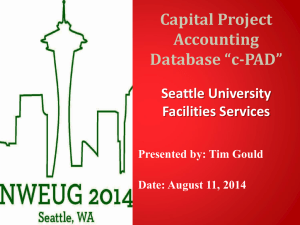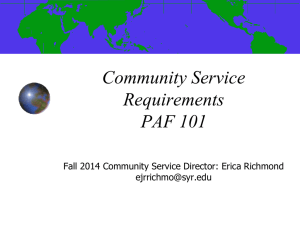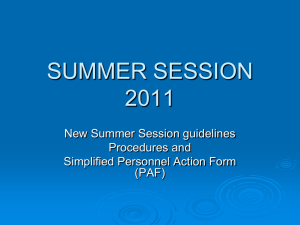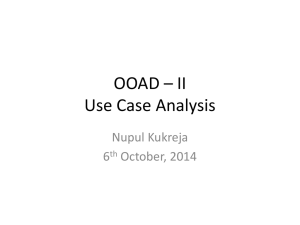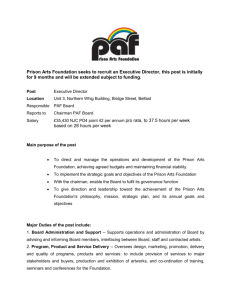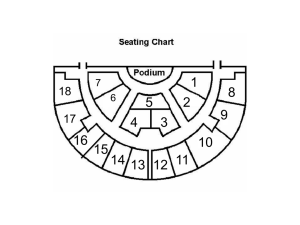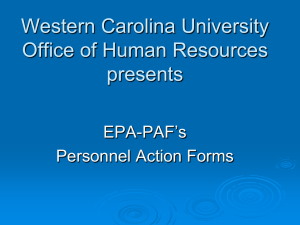PAF G 620 -- Analytic Skills for Policy Analysis I
advertisement
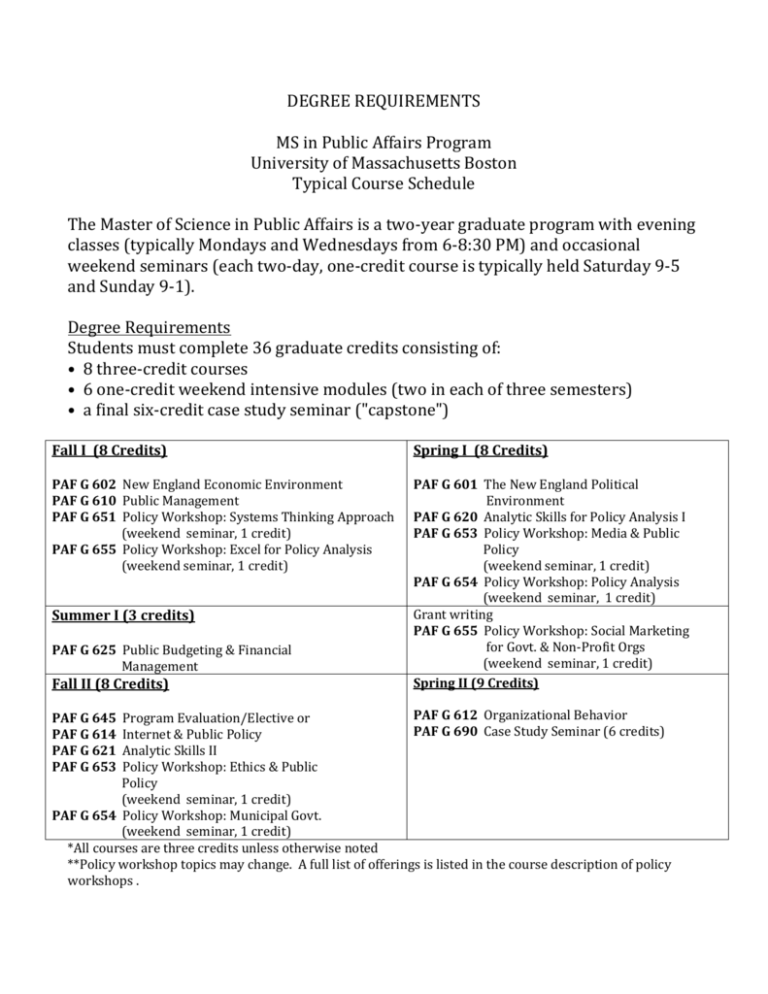
DEGREE REQUIREMENTS MS in Public Affairs Program University of Massachusetts Boston Typical Course Schedule The Master of Science in Public Affairs is a two-year graduate program with evening classes (typically Mondays and Wednesdays from 6-8:30 PM) and occasional weekend seminars (each two-day, one-credit course is typically held Saturday 9-5 and Sunday 9-1). Degree Requirements Students must complete 36 graduate credits consisting of: • 8 three-credit courses • 6 one-credit weekend intensive modules (two in each of three semesters) • a final six-credit case study seminar ("capstone") Fall I (8 Credits) Spring I (8 Credits) PAF G 602 New England Economic Environment PAF G 610 Public Management PAF G 651 Policy Workshop: Systems Thinking Approach (weekend seminar, 1 credit) PAF G 655 Policy Workshop: Excel for Policy Analysis (weekend seminar, 1 credit) PAF G 601 The New England Political Environment PAF G 620 Analytic Skills for Policy Analysis I PAF G 653 Policy Workshop: Media & Public Policy (weekend seminar, 1 credit) PAF G 654 Policy Workshop: Policy Analysis (weekend seminar, 1 credit) Grant writing PAF G 655 Policy Workshop: Social Marketing for Govt. & Non-Profit Orgs (weekend seminar, 1 credit) Spring II (9 Credits) Summer I (3 credits) PAF G 625 Public Budgeting & Financial Management Fall II (8 Credits) PAF G 612 Organizational Behavior Program Evaluation/Elective or PAF G 690 Case Study Seminar (6 credits) Internet & Public Policy Analytic Skills II Policy Workshop: Ethics & Public Policy (weekend seminar, 1 credit) PAF G 654 Policy Workshop: Municipal Govt. (weekend seminar, 1 credit) *All courses are three credits unless otherwise noted **Policy workshop topics may change. A full list of offerings is listed in the course description of policy workshops . PAF G 645 PAF G 614 PAF G 621 PAF G 653 COURSE DESCRIPTIONS MS in Public Affairs Program University of Massachusetts Boston PAF G 601 New England Political Environment An introduction to the key contemporary systems that now constitute the environment in which legislative and executive policy-making and implementing processes work. This course is designed to provide a thorough understanding (in theory and practice) of: where, how, and by whom policy is made and implemented; how the process is/can be influenced; who pays and who benefits; and how to evaluate results (intended and actual). PAF G 602 The New England Economic Environment This course introduces the student to the theory and tools of regional economies as a framework for analyzing policy issues. The economic and fiscal structure of Massachusetts is studied to identify the inner and outer workings of the Massachusetts economy vis-a-vis New England and the nation. The latter part of the course focuses on the economics of major issues facing policy makers. Such issues include public and private housing, health care costs, public pensions, fiscal and economic competitiveness and the economics of the capital city, Boston. PAF G 610 Public Management: Theories & Principles This course explores the complex environment in which today's public managers must effectively function. It introduces students to the various theories of complex organizations, with a particular emphasis on those developments most relevant to public organizations. As part of the effort to relate theory to practice, students' own work experiences become a legitimate and important aspect of the subject matter. PAF G 612 Organizational Behavior This course examines the nature of human behavior in public sector organizations as a function of the individual, the groups within which he or she interacts, and the organizational setting. Topics include such things as motivation, leadership, adaptation, socialization, conflict, and communication. PAF G 620 -- Analytic Skills for Policy Analysis I Skills for Policy Analysis. This course will introduce a variety of policy analysis tools for policymakers and public managers/administrators; provide an overview of how public policy is shaped by research and numerical data; encourage students to generate research questions and match research methods to the questions; teach how to interpret numerical data in tables, charts, research reports and articles; introduce basic statistical results as they inform public policy decision making. PAF G 621 Analytic Skills for Policy Analysis II Research Methods. This course will provide a more in-depth focus on the Case Study Method and its related skills including interviewing, analysis of documents/archives, analysis of prior research findings, qualitative research skills and analysis, and determination of policy implications. Students will cover both theoretical aspects of these topics and will apply them as they prepare their capstone proposal. PAF G 625 Public Budgeting and Financial Management The public budgeting process in theory and practice. Students are introduced to contemporary approaches to public budgeting as well as to the difficulty of planning in the public sector, the dilemmas of choice and of priority setting, the results of incrementalism, and the nature of budgetary "rationality." In addition, the course examines the nature and scope of public financial management at the state and local level. It familiarizes students with state and local government financial reporting and accounting, current operating expenditures, techniques for evaluating capital expenditures and products. It explores borrowing and debt management, evaluation of municipal credit quality, managing cash assets and liquid securities, simulations and financial forecasting, and evaluating and controlling financial management practices. PAF G 645 Program Evaluation This course explores the issues involved in and techniques applicable to evaluation of programs in the public sector. The course focuses on how to define programmatic objectives and output measures and how to develop evaluation methods and instruments. It further addresses how to implement such studies and demonstrate their worth. PAF G 651, 652, 653, 654, 655 Policy Workshops, 1 credit each A series of weekend workshops addressing public policy issues of concern to the Commonwealth. Workshop offerings include: PAF G 65X PAF G 65X PAF G 65X PAF G 65X PAF G 65X PAF G 65X PAF G 65X PAF G 65X Policy Workshop: Systems Thinking Approach Policy Workshop: Excel for Policy Analysis Policy Workshop: Media & Public Policy Policy Workshop: Policy Analysis Policy Workshop: Grant writing Policy Workshop: Social Marketing for Govt. & Non-Profit Orgs Policy Workshop: Ethics & Public Policy Policy Workshop: Municipal Govt. PAF G 690 Case Study Seminar, 6 credits Students in the MS in Public Affairs Program complete a final project under the supervision of a faculty advisor. The project may be a case study of a public policy or significant piece of legislation which involves tracing its history, analyzing the political, economic, and social context in which it developed, identifying and examining the roles played by those who were instrumental in its development, and assessing its intended and actual impact. It may also be a critical examination of a policy issue confronting a student at his or her place of employment. While completing their case study project, students participate in a weekly seminar that focuses both on the substantive issues under examination and on case study methodology. PAF G 695 and PAF G 696 Independent Study, 1-3 credits These are advanced courses of independent readings under the guidance and subject to the examination of the instructor. Areas and topics are chosen according to student need. Hours by arrangement.

